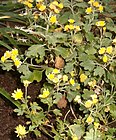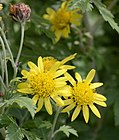Note: This is a project under development. The articles on this wiki are just being initiated and broadly incomplete. You can Help creating new pages.
Chrysanthemum indicum
Chrysanthemum indicum is an erect, aromatic, perennial plant producing a clump of stems 25 - 100cm tall from procumbent rhizomes. The plant is harvested from the wild for local use as a food and medicine. It is sometimes cultivated for medicinal use.
Contents
- 1 Uses
- 2 Parts Used
- 3 Chemical Composition
- 4 Common names
- 5 Properties
- 6 Habit
- 7 Identification
- 8 List of Ayurvedic medicine in which the herb is used
- 9 Where to get the saplings
- 10 Mode of Propagation
- 11 How to plant/cultivate
- 12 Commonly seen growing in areas
- 13 Photo Gallery
- 14 References
- 15 External Links
Uses
Furuncle, Scrofula, Deep-rooted boils, Inflammation of the throat, Eczema, Itchiness of the skin, Hypertension.
Parts Used
Chemical Composition
Common names
| Language | Common name |
|---|---|
| Kannada | Shavantige, Shyavantige |
| Hindi | Chandramallika |
| Malayalam | |
| Tamil | Saamandi |
| Telugu | Chamunti |
| Marathi | Shevati |
| Gujarathi | |
| Punjabi | |
| Kashmiri | |
| Sanskrit | Bahupatrika |
| English | Indian Chrysanthemum, Chrysanthemum |
Properties
Reference: Dravya - Substance, Rasa - Taste, Guna - Qualities, Veerya - Potency, Vipaka - Post-digesion effect, Karma - Pharmacological activity, Prabhava - Therepeutics.
Dravya
Rasa
Guna
Veerya
Vipaka
Karma
Prabhava
Habit
Identification
Leaf
| Kind | Shape | Feature |
|---|---|---|
Flower
| Type | Size | Color and composition | Stamen | More information |
|---|---|---|---|---|
| {{{5}}} |
Fruit
| Type | Size | Mass | Appearance | Seeds | More information |
|---|---|---|---|---|---|
Other features
List of Ayurvedic medicine in which the herb is used
Where to get the saplings
Mode of Propagation
How to plant/cultivate
Chrysanthemum indicum is a plant of the temperate zone and a parent of the cultivated Chrysanthemums. Although temperate in origin, it can be grown successfully in tropical areas and is often cultivated in southeast Asia.[3]
Commonly seen growing in areas
Grasslands on mountain slopes, Thickets, Wet places by rivers, Fields, Roadsides.
Photo Gallery
References
- ↑ [Chemical constituents]
- ↑ [Morphology]
- ↑ Cultivation
External Links
- Ayurvedic Herbs known to be helpful to treat Furuncle
- Ayurvedic Herbs known to be helpful to treat Scrofula
- Ayurvedic Herbs known to be helpful to treat Deep-rooted boils
- Ayurvedic Herbs known to be helpful to treat Inflammation of the throat
- Ayurvedic Herbs known to be helpful to treat Eczema
- Ayurvedic Herbs known to be helpful to treat Itchiness of the skin
- Ayurvedic Herbs known to be helpful to treat Hypertension
- Herbs with Flower heads used in medicine
- Herbs with Young leaves used in medicine
- Herbs with common name in Kannada
- Herbs with common name in Hindi
- Herbs with common name in Tamil
- Herbs with common name in Telugu
- Herbs with common name in Marathi
- Herbs with common name in Sanskrit
- Herbs with common name in English
- Habit - Perennial
- Index of Plants which can be propagated by Seeds
- Herbs that are commonly seen in the region of Grasslands on mountain slopes
- Herbs that are commonly seen in the region of Thickets
- Herbs that are commonly seen in the region of Wet places by rivers
- Herbs that are commonly seen in the region of Fields
- Herbs that are commonly seen in the region of Roadsides
- Herbs
- Pages without herbs images




